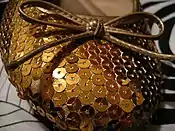sequin
English

(2) Gold sequins on a shoe
Etymology
Borrowed from French sequin, from Italian zecchino, from zecca (“mint”), from Arabic سِكَّة (sikka, “die for coining, coin”). Doublet of zecchin.
Pronunciation
- IPA(key): /ˈsiː.kwɪn/
Noun
sequin (plural sequins)
- (historical) Any of various small gold coins minted in Italy and Turkey.
- 1883: Robert Louis Stevenson, Treasure Island
- English, French, Spanish, Portuguese, Georges, and Louises, doubloons and double guineas and moidores and sequins, the pictures of all the kings of Europe for the last hundred years, strange Oriental pices stamped with what looked like wisps of string or its of spider's web, round pieces and square pieces, and pieces bored through the middle, as if to ware them round your neck - nearly every variety of money in the world must, I think, have found a place in that collection...
- 1883: Robert Louis Stevenson, Treasure Island
- A sparkling spangle used for the decoration of ornate clothing.
Translations
Italian/Turkish coin
sparkling spangle used for decoration of ornate clothing:
|
See also
French
Etymology
From Italian zecchino, from zecca (“mint”), from Arabic سِكَّة (sikka, “die for coining, coin”).
Pronunciation
- IPA(key): /sə.kɛ̃/
Synonyms
- (decoration) paillette
Further reading
- “sequin” in le Trésor de la langue française informatisé (The Digitized Treasury of the French Language).
This article is issued from Wiktionary. The text is licensed under Creative Commons - Attribution - Sharealike. Additional terms may apply for the media files.